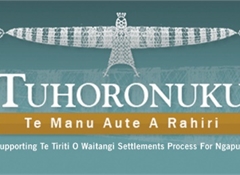News
91% of Ngapuhi consider treaty settlement, unity important
26 May 15

The settlement of historical Te Tiriti Waitangi grievances and iwi unity are growing in importance to Ngāpuhi, a Horizon Research survey report finds.
Compared to a survey two years ago, the Ngāpuhi wish for settlement and tribal unity has strengthened, with more than 90% of those surveyed seeing these two issues as among the most important facing the iwi today.
In 2013 85% of Ngāpuhi felt settlement was important, whereas this year that number has risen to 91%.
The report also found that 2015 respondents “tended to be forward looking”, compared to the previous surveys which had slightly more focus on internal tensions.
“Ngāpuhi respondents are clearly looking for the resources that settlement of Treaty grievances will bring to be used for the good of all the people in the iwi,” says the report.
As with the 2011 and 2013 Horizon Research Ngāpuhi Surveys, education, health, jobs, and housing continue to be the areas Ngāpuhi overwhelmingly hope that the coming Te Tiriti o Waitangi settlement will provide benefits.
Other key findings in the 2015 survey:
- Ownership of whenua (land) was seen as the most important benefit for both hapū and marae post-settlement. Kaitiakitanga of resources was the second most important benefit for hapū and third for Marae (development of self-sustainability being second).
- As in 2013, the greatest benefit for overseas Ngāpuhi was thought to be more employment opportunities in Aotearoa, with the second most important benefit being access to scholarships and funding.
- 80% overall said they were aware of who their hapū was, which is down from 86% on the 2013 survey. Awareness among Ngāpuhi in Northland was nearly universal, but was significantly lower among Ngāpuhi living in Auckland.
The survey was commissioned by Tūhoronuku IMA, the entity mandated by Ngāpuhi in 2011 to begin direct negotiations with the Government to settle all historical Crown breaches and grievances against Ngāpuhi. Conducted during April this year, the Horizon Research Ngāpuhi Survey, is a biennial “taking the pulse of Ngāpuhi” on settlement and related issues.
Said Sonny Tau, Chairman of Tūhoronuku IMA: “Employment continues to be the biggest issue facing Ngāpuhi today, and an issue our people hope will be addressed by settlement.
“This outcome reflects the high unemployment rates for Maori in Northland and Auckland. For Ngāpuhi in Northland, the Census 2013 found 51% of those 15 and over were either unemployed or out of the workforce, which no one can deny is at crisis level.”
The survey report says Ngāpuhi are concerned that the resources of settlement must be well managed, and “used equitably for all Ngāpuhi.”
Mr Tau said Tūhoronuku, gave their commitment they would continue to communicate with Ngāpuhi throughout the settlement process.
“This biennial Horizon Research Ngāpuhi Survey is part of that communication. It is important that we have this up-to-date feed-back on what Ngāpuhi are thinking, and we thank all those who participated. This survey helps inform us as we start negotiating with the Crown.”
The full Horizon Research Ngāpuhi Survey 2015 report can be found on the Tūhoronuku Independent Mandated Authority (Tūhoronuku IMA) website tuhoronuku.com – the home of all information about the Ngāpuhi settlement journey.
For further information please contact Kipa Munro
Mobile: 027 555 3852
Email: kipa.munro@Tūhoronuku.co.nz
Tūhoronuku Independent Mandated Authority is the mandated entity to represent all Ngāpuhi - no matter where we live – to negotiate a settlement of all Crown grievances against Ngāpuhi and Te Tiriti o Waitangi.
About the Horizon Research survey:
It was conducted during April 2015. Members of the Horizon Research Māori Panel who had identified their Iwi as Ngāpuhi were invited to take part. 274 Ngāpuhi completed the survey, giving a maximum margin of error of +/- 5.9%.
The sample is weighted by gender, age and personal income to match the Ngāpuhi population demographics at the 2013 Census.
HorizonPoll Online Survey system
and website developed by BEWEB
Copyright © 2010. HorizonPoll incorporating ShapeNZ - Listening to New Zealand


